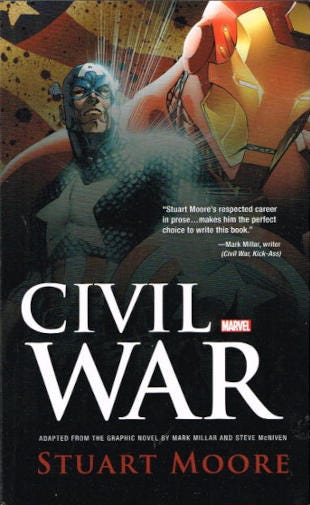Looks like we have the only time Humble Bundle will do anything with Marvel books. Literal books! No pictures, just text! Because some of these are directly based on actual comics, I’m gonna lay out the best adaptations.
Disclaimer
If you’re wondering why this isn’t on my website’s Adaptations Done Right section. It’s because I tend to fall asleep when I read text for hours on end. Even a few audiobooks. So I’m going to regurgitate what other people say.
…It’s not lazy! I told everyone I wasn’t gonna put myself to sleep or do stuff that feels like work instead of for fun!
Also, this is not sponsored at all!
Marvel Civil War
To prove that point let’s start off with a book not in Humble Bundle.
Marvel Civil War is a subject people don’t want to touch any longer. It’s nothing but a debate club topic that’s been done to death. Instead we’re going over the only adaptation that people will have a right to get enthralled in. The prose novel by Stuart Moore.
One of the main problems with the comic is obligatory fight scenes over characterization. Sure there’s an intense atmosphere, but that’s because of what was going around the offices around the Bush administration. Basically people’s anxieties spill over into the pages with big over-the-top surprises.
That’s where the word and audio books thrive, focusing on the same feelings but expanding where comics can’t. Key figures like Captain America, Iron Man, Spider-Man, and the Fantastic Four’s Invisible Woman and Mr. Fantastic each get their own internal thoughts, conflicts, and the motivations when it comes to their sense of right and wrong. This gives every battle and political situation grounded stakes to every action.
Of course, not being limited by tones of paranoia, there are somber moments of introspection. The kind that ask important questions about what drove them to heroism. The stuff that people actually liked, the concept of a Civil War not the event itself.
Plus the ending with a certain person’s death echoes all too real assassinations and assassination attempts. No needlessly complicated plots by supervillains (like the comics). Or government conspiracies, just paranoid, antisocial people taking their resentments out on others by taking full advantage of the cracks in national security. Almost a mirror to what kicked everything off, throwing a monkey wrench into everything.
(Please be aware that I did not actually read the end, I read the reviews by people. They don’t even say which star was lost. I just remember Captain America’s death fitting better in this scenario. So it’s possible to disregard this last part.)
The Death of Captain America
FYI, this is not a sequel to the above. It is a straight adaptation of the comics, but not what came afterwards. It just goes into more detail about the emotional and political fallout of Steve Rogers’ death.
Iron Man and Sharon Carter deal with how they were played into delivering Captain America to his killers. While Winter Soldier and the Falcon deal with their grief in their own ways.
The hole where Captain America was is felt throughout, with many political actors taking advantage of the scenario to advance superhuman regulation. Even using Steve Roger’s assassination as a reason for it despite being a separate affair. Where even Iron Man’s stance for such things is starting to slip.
Worse yet, it stopped being about Steve Rogers and what Captain America came to represent in a divided era. All without any of the more absurd elements of the comic like time travel.
X-Men: Days of Future Past
Speaking of, the novel version of this classic title brought a more comprehensive background to the dystopian future. Including stuff later touched on by the late Ed Piskor. Like what few allies made memorable stances against the Sentinels to buy time.
Unique to it are the parallels between the past and future. Where readers gets the full effects of what time and the Sentinels made the X-Men and the Brotherhood of Mutants into. Even New York City felt like a character in this context.
Kat Pryde in particular gets some of the most dynamic development. She’s at a practical crossroads in her life as a superhero but also into her later years as a hardened survivor. Both before and after the resolution.
Spider-Man: Kraven’s Last Hunt
The audiobook heightens the atmospheric immersion with sound effects and music to complement the inner monologues. Kraven in particular gets some expansion that the original writer J.M. DeMatteis needed to specify years later.
Kraven was somebody genuinely going through an existential crisis. He exists in a headspace between an all too human mind and an animal seeking dominance. Every plan and ritual Kraven does feels like a wounded predator trying to stave off personal demons. Less he falls into the mental illness inherited from his mother.
Which is what makes Kraven’s fight against Vermin as Spider-Man all the more relevant. Vermin fell to mental illness as a result of abuse and practically became an animal. So when Kraven beats and captures Vermin, he’s trying to conquer the predator within. With Spider-Man in Kraven’s eye being the symbiosis of sapience and apex predator.
Anything after this would just be going over the comic.




Nice piece! I really find the Marvel and DC novels an interesting part of their publishing universes. I feel that they're highly underrated, maybe because I think the two companies have no idea how to go about these projects. In the past few years, both have put out a number of young adult books.
Superhero prose fiction (which is some of what I write) should be a bigger deal than it is.